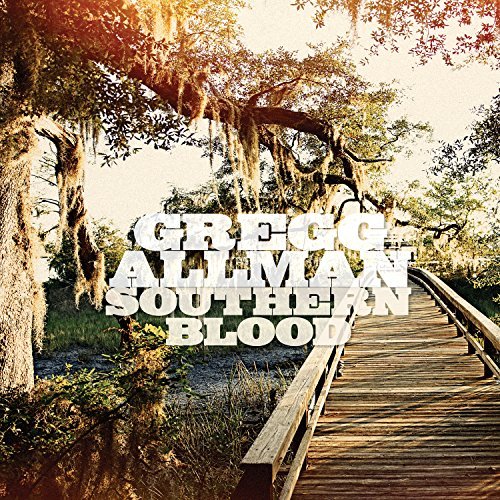
Gregg Allman
Southern Blood
Rounder Records
When I received my copy of Southern Blood, the highly anticipated posthumous release from Gregg Allman, I could not bring myself to listen to it immediately. Both the writer and the die-hard fan within me were at a bittersweet crossroads. Once I finally gathered enough courage to listen, cognizant that I was embarking on the musical sunset of Allman’s colorful and storied life, I cried for three hours nonstop as I listened again and again. I knew it would be hard, but I never thought that it would be THAT hard. Recorded at FAME Studios in Muscle Shoals, Alabama and brilliantly produced by industry legend, Don Was, the meticulously chosen ten songs (eight covers plus one song written by Scott Sharrard, Allman’s band leader and guitarist, and another co-written by Allman and Sharrard) embody Allman’s final, poignant parting gift to his fans and absolutely tear at the heartstrings. Every bit as good yet strikingly different than Allman’s iconic 1973 debut solo record, the Johnny Sandlin-produced treasure, Laid Back, Southern Blood allows Allman to transition in his own way, on his own terms.
Co-written with Sharrard, “My Only True Friend” kicks off the record with emotive retrospection, and as Sharrard has stated, the song was written from the perspective of Allman’s late brother, Duane, but Allman never knew this. With the impassioned lyrics of a man in the twilight of his life, it is a moving testament to the roller coaster existence of Gregory Lenoir Allman.
Heavily influenced by Tim Buckley, Allman’s reinterpretation of Buckley’s “Once I Was” gives it fresh life, and I prefer the use of the full band as opposed to guitar and harmonica in the original. In fact, while I normally love harp, I find it somewhat jarring on Buckley’s 1967 release, Goodbye and Hello.
Falling into the “Bob Dylan as writer not singer” club, I’m always a fan of anyone recording a Dylan tune and creating a listenable masterpiece, and Allman could not have made a more fitting choice than “Going, Going Gone.” With understated guitar and backed by somber horns and the soulful vocals of the McCrary Sisters (who appear on five of the album tracks), Allman has that uncanny ability of morphing an otherwise acoustic number into a full-band gem.
While Allman remains relatively true to the original, Jerry Garcia would revel in the inclusion of The Grateful Dead’s “Black Muddy River” (Jerry Garcia/Robert Hunter) on this farewell collective. The lyrics reflect a man at the close of his journey, and, as on several of these tracks, it becomes heartbreaking to hear Allman sing these words, fully aware that his time was waning.
Switching up gears to the blues-infused, Willie Dixon-penned “I Love The Life I Live,” Allman lightens the mood considerably, and then follows it with the more somber Little Feat, Lowell George classic, “Willin’” which is absolutely stellar. Throwing some major funk into the mix, the Jackie Avery nugget, “Blind Bats and Swamp Rats” adds a fun groove to the record. It’s hard not to compare it to the iconic Johnny Jenkins version, however, so while I enjoy Allman’s take on the classic, it doesn’t quite work for me as well as the others.
Paying homage to the one and only Percy Sledge and Muscle Shoals legendary songwriting team, Spooner Oldham and Dan Penn, Allman absolutely slays “Out of Left Field” with soul-drenched sizzle oozing out of every note, and once again the McCrary Sisters add the finishing touch. Lightening things up next with the Sharrard winner, “Love Like Kerosene,” Allman’s version (with standout piano from Peter Levin) offers a slower tempo than the more frenetic Sharrard version, but both will get you moving.
This brings the record to the closer, Jackson Browne’s “Song For Adam,” on which Browne also is featured. Have a box of tissues handy, because you will need it. As you listen, knowing in the back of your mind what you know, you feel the heartbreak envelop you in such a visceral way that is uncanny. You can hear Allman’s voice break as he sings the basically autobiographical words, “still it seems he stopped singing in the middle of his song,” and that is about as tough a pill to swallow as any. Incidentally, Allman covered a snippet of this song years ago and included it on the erstwhile One More Try: An Anthology, which unfortunately was pulled almost as soon as it was released due to disputes with the record label.
Few artists have touched more souls and left such an enduring body of work and a more loyal fan base than Gregg Allman. He may be gone from this world, but his spirit will linger long after him through his music. “I hope you’re haunted by the music of my soul when I’m gone.” I think it’s a safe bet.












